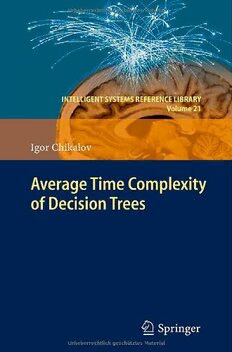
Average Time Complexity of Decision Trees PDF
Preview Average Time Complexity of Decision Trees
IgorChikalov AverageTimeComplexityofDecisionTrees Intelligent Systems Reference Library, Volume 21 Editors-in-Chief Prof.JanuszKacprzyk Prof.LakhmiC.Jain SystemsResearchInstitute UniversityofSouthAustralia PolishAcademyofSciences Adelaide ul.Newelska6 MawsonLakesCampus 01-447Warsaw SouthAustralia5095 Poland Australia E-mail: [email protected] E-mail: [email protected] Furthervolumesofthisseriescanbefound onourhomepage:springer.com Vol.5.GeorgeA.Anastassiou Vol.13.WitoldPedryczandShyi-MingChen IntelligentMathematics:Computational (Eds.) Analysis,2010 GranularComputingandIntelligentSystems, ISBN978-3-642-17097-3 2011 ISBN978-3-642-19819-9 Vol.6.LudmilaDymowa Vol.14.GeorgeA.AnastassiouandOktay SoftComputinginEconomicsandFinance, Duman 2011 TowardsIntelligentModeling:Statistical ISBN978-3-642-17718-7 ApproximationTheory,2011 ISBN978-3-642-19825-0 Vol.7.GerasimosG.Rigatos ModellingandControlforIntelligent Vol.15.AntoninoFrenoandEdmondo IndustrialSystems,2011 Trentin ISBN978-3-642-17874-0 HybridRandomFields,2011 ISBN978-3-642-20307-7 Vol.8.EdwardH.Y.Lim,JamesN.K.Liu, and Vol.16.AlexieiDingli RaymondS.T.Lee KnowledgeAnnotation:MakingImplicit KnowledgeSeeker–OntologyModellingfor KnowledgeExplicit,2011 Information ISBN978-3-642-20322-0 SearchandManagement,2011 ISBN978-3-642-17915-0 Vol.17.CrinaGrosanandAjithAbraham IntelligentSystems,2011 ISBN978-3-642-21003-7 Vol.9.MenahemFriedmanandAbraham Kandel Vol.18.AchimZielesny CalculusLight,2011 FromCurveFittingtoMachineLearning, ISBN978-3-642-17847-4 2011 ISBN978-3-642-21279-6 Vol.10.AndreasTolkandLakhmiC.Jain Intelligence-BasedSystemsEngineering,2011 Vol.19.GeorgeA.Anastassiou ISBN978-3-642-17930-3 IntelligentSystems:Approximationby ArtificialNeuralNetworks,2011 ISBN978-3-642-21430-1 Vol.11.SamuliNiiranenandAndreRibeiro (Eds.) Vol.20.LechPolkowski InformationProcessingandBiological ApproximateReasoningbyParts,2011 Systems,2011 ISBN978-3-642-22278-8 ISBN978-3-642-19620-1 Vol.21.IgorChikalov Vol.12.FlorinGorunescu AverageTimeComplexityofDecisionTrees, DataMining,2011 2011 ISBN978-3-642-19720-8 ISBN978-3-642-22660-1 Igor Chikalov Average Time Complexity of Decision Trees 123 Dr.IgorChikalov Mathematical andComputer Sciences and EngineeringDivision 4700 KingAbdullahUniversityof Science and Technology Thuwal 23955-6900 Kingdom of SaudiArabia E-mail: [email protected] ISBN 978-3-642-22660-1 e-ISBN 978-3-642-22661-8 DOI 10.1007/978-3-642-22661-8 Intelligent SystemsReference Library ISSN1868-4394 Library of Congress Control Number:2011932437 (cid:2)c 2011 Springer-VerlagBerlin Heidelberg This work is subject to copyright. All rights are reserved, whether the whole or partofthematerialisconcerned,specificallytherightsoftranslation,reprinting, reuse of illustrations, recitation, broadcasting, reproduction on microfilm or in any other way, and storage in data banks. Duplication of this publication or parts thereof is permitted only under the provisions of the German Copyright Law of September 9, 1965, in its current version, and permission for use must always beobtained fromSpringer.Violationsare liabletoprosecution underthe German Copyright Law. The use of general descriptive names, registered names, trademarks, etc. in this publicationdoesnotimply,evenintheabsenceofaspecificstatement,thatsuch namesareexemptfromtherelevantprotectivelawsandregulationsandtherefore free for general use. Typeset&CoverDesign:ScientificPublishingServicesPvt.Ltd.,Chennai,India. Printed on acid-free paper 9 8 7 6 54 3 2 1 springer.com To my wife Julia and our daughter Svetlana, for always believing in me and loving me, no matter what. Foreword Itisourgreatpleasuretowelcomeanewbook“AverageTimeComplexityof DecisionTrees”byIgorChikalov.Thisbookisdevotedtothestudyofaverage timecomplexity(averagedepthandweightedaveragedepth)ofdecisiontrees over finite and infinite sets of attributes. It contains exact and approximate algorithms for decision tree optimization, and bounds on minimum average timecomplexityofdecisiontrees.Theaveragetime complexitymeasurescan be used in searching for the minimum description length of induced data models. Hence, there exist relationships of the presented results with the minimum description length principle (MDL). Theconsideredapplicationsincludethestudyofaveragedepthofdecision trees for Boolean functions from closed classes, the comparison of results of the performance of greedy heuristics for average depth minimization with optimal decision trees constructed by dynamic programming algorithm, and optimization of decision trees for the corner point recognition problem from computer vision. The book can be interesting for researchers working on time complexity of algorithms and specialists in machine learning. The author, Igor Chikalov, received his PhD degree in 2002 from Nizhny Novgorod State University, Russia. During nine years he was working for Intel Corp. as a senior software engineer/researchscientist in machine learn- ing applications to the control and diagnostic problems of semiconductor manufacturing. Since 2009 he is a senior research scientist in King Abdul- lahUniversityofScienceandTechnology,SaudiArabia.His currentresearch interestsincludesupervisedmachinelearningandextensionsofdynamicpro- gramming to the optimization of decision trees and decision rules. The author deserves the highest appreciation for his outstanding work. Mikhail Moshkov May 2011 Andrzej Skowron Preface The monographis devoted to theoretical and experimental study of decision trees with a focus on minimizing the averagetime complexity. The study re- sulted in upper and lower bounds on the minimum average time complexity of decision trees for identification problems. Previously known bounds from information theory are extended to the case of identification problem with an arbitrary set of attributes. Some examples of identification problems are presentedgivinganevidencethattheobtainedboundsareclosetounimprov- able. In addition to universal bounds, we study effectiveness of representing several types of discrete functions in a form of decision trees. In particular, for each closed class of Boolean functions we obtained upper bounds on the average depth of decision trees implementing functions from this class. The monograph also studies the problem of algorithm design for optimal decision tree construction. An algorithm based on dynamic programming is proposed that describes a set of optimal trees and allows for subsequent optimizationonothercriteria.Experimentalresultsshowapplicabilityofthe algorithm to real-life applications that are represented by decision tables containing dozens of attributes and several thousands of objects. Beside individual identification problems, infinite classes of problems are considered.It describes necessaryconditions onsuch classesin order to have polynomial complexity algorithms for optimal decision tree construction. The presented results can be of interest for researchers in test theory, rough set theory and machine learning. Some results may be considered for includingingraduatecoursesondiscretemathematicsandcomputerscience. The monographcan be used as a reference to prior results in the area. Some results were obtained in collaboration with Dr. Mikhail Moshkov and published in joint papers [51, 52, 53, 54, 56]. I am heartily thankful to Dr. Moshkov for help in preparing this book.
